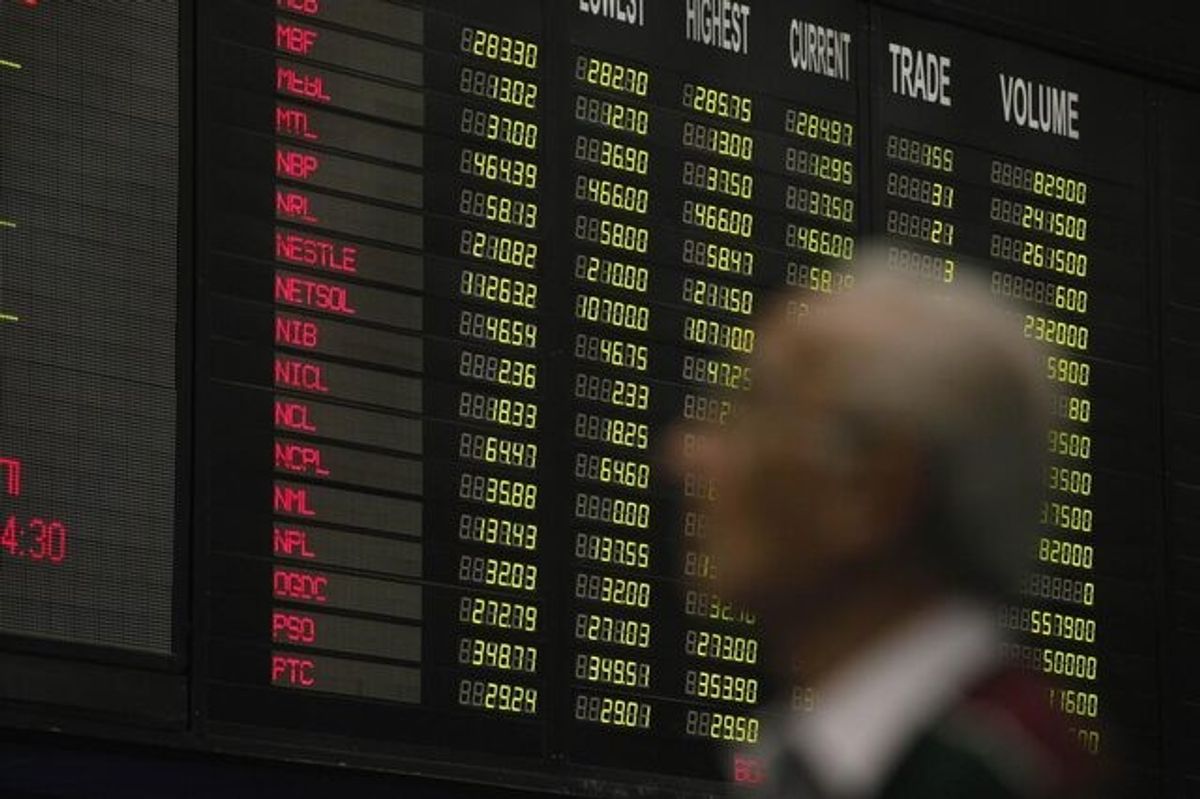Poor results, geopolitics keep Pakistan equities subdued during October
The benchmark KSE-100 Index closed at 161,632 points, down 2.3% month-on-month
Business Desk
The Business Desk tracks economic trends, market movements, and business developments, offering analysis of both local and global financial news.

The KSE-100 Index is currently trading at a price-to-earnings ratio of 7.9 times, below its 15-year average of 8.6 times
Pakistan’s benchmark KSE-100 Index lost momentum in October, closing the month at 161,632 points, down 3,862 points or 2.3% month-on-month as investor sentiment weakened amid institutional selling, foreign fund outflows, and geopolitical concerns.
According to market data compiled by brokerage houses, the index also declined 2.2% in U.S. dollar terms, reflecting the combined impact of a softer rupee and lower equity valuations. Analysts said some company results that came in below expectations also contributed to the month’s bearish tone.
The market remained subdued during October despite several positive triggers.
Pakistan reached a staff-level agreement with the International Monetary Fund (IMF) on the second review of its $7 billion Extended Fund Facility and the first review of the $1.3 billion Resilience and Sustainability Facility, providing some policy reassurance.
The State Bank of Pakistan’s Monetary Policy Committee kept the policy rate unchanged at 11%, maintaining a cautious stance amid moderating inflation and a stable current account position.
The current account posted a surplus of $110 million in September, compared with a deficit of $325 million in the previous month, while foreign exchange reserves rose by $71 million to reach $14.47 billion, according to central bank data.
Trading activity and sector performance
Average daily trading volumes on the Pakistan Stock Exchange (PSX) rose 7% month-on-month to 1.43 billion shares, while the average daily traded value declined 4.1% to $187 million, suggesting heightened speculative activity but limited large-cap participation.
The technology, power, banking, and investment banking sectors saw the highest trading volumes, averaging 328 million, 235 million, 176 million, and 105 million shares, respectively.
On a stock basis, K-Electric led trading volumes with 214.8 million shares, followed by WorldCall Telecom with 188.7 million, Bank of Punjab (BOP) with 103.3 million, Pakistan Telecommunication Co. (PTC) with 55.7 million, and Telecard with 45.3 million shares.
In terms of trade value, the banking, technology, exploration & production (E&P), oil & gas marketing companies, and cement sectors dominated, contributing $35, $19, $16, $15, and $15, respectively.
The most traded scrips by value were BOP ($12.9 million), Pakistan State Oil ($9.8 million), Hub Power Co. ($8.3 million), PTC ($7 million), and Mari Petroleum ($5.8 million).
Sector and stock contributions
Sector-wise, banks, fertilizer, and technology provided the largest positive contributions to the index during the month, adding 1,796 points, 595 points, and 237 points, respectively. On the downside, E&P, Cement, and investment banks dragged the index lower by 1,475 points, 1,429 points, and 1,139 points, respectively.
Among individual stocks, Fauji Fertilizer Co. added 747 points, followed by BOP (352 points), Habib Bank Ltd. (327 points), National Bank of Pakistan (302 points), and Meezan Bank Ltd. (279 points). The biggest drags came from Engro Holdings (-1,341 points), Pakistan Oilfields (-414 points), Pakistan Petroleum Ltd. (-392 points), Hub Power (-367 points), and Oil & Gas Development Co. (-337 points).
Gainers and losers
Insurance (+13%), Investment Banks (+12%), transport (+10%), and paper (+4%) outperformed the market in October, while glass (-24%), textile weaving (-20%), power (-19%), and engineering (-19%) were among the weakest performers.
Top-performing individual stocks included PTC (+31%), Pakistan Stock Exchange Ltd. (PSX, +31%), BOP (+28%), Pakistan Services Ltd. (PSEL, +19%), and Askari Bank (AKBL, +16%). Major decliners were TPL REIT Fund I (-34%), PKGP (-33%), TGL (-24%), KEL (-23%), and Ghani Glass (-22%).
Investor activity and valuation
On the local front, buying was led by banks and development finance institutions ($246.2 million), followed by individual investors ($70.3 million), companies ($25.3 million), and non-banking financial companies ($0.25 million).
Selling was recorded by mutual funds ($242.3 million), insurance companies ($63.1 million), other organizations ($8.4 million), and brokers ($3 million).
The KSE-100 Index is currently trading at a price-to-earnings ratio (P/E) of 7.9 times, below its 15-year average of 8.6 times, and offers a dividend yield of approximately 6.2%, broadly in line with its historical average of 6.1%.
Analysts said valuations remain attractive for long-term investors, though short-term sentiment may remain cautious amid global and regional uncertainties.










Comments
See what people are discussing